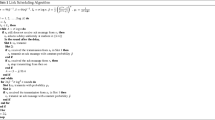Abstract
A distributed algorithm for the conflict-free channel allocation in CDMA (code division multiple access) networks is presented. Dynamic adjustment to topological changes is also considered. Though the schedules produced by our algorithm are not optimal with respect to link schedule length, the algorithm is simple and practical. The link schedule length minimization problem is NP-complete. Here the length of a link schedule is the number of time slots it uses. The algorithm guarantees a bound 2Δ — 1 time slots on the TDMA cycle length, where Δ is the maximum degree of a station (i.e., maximum number of stations that a station can reach by radio links) in the network. The message complexity of a station isO(Δ).
Similar content being viewed by others
References
Larry Jordan and Bruce Churchill,Communications and Networking, Brady Publishing, New York, 1992.
R. L. Pickholtz, L. B. Milstein, and D. L. Schilling, Spread spectrum for mobile communications,IEEE Trans. Vehic. Tech., Vol. 40, No. 2, pp. 313–322, 1991.
D. L. Schilling, R. Pickholtz, and B. L. Milstein, Spread spectrum goes commercial,IEEE Spectrum, pp. 41–45, 1990.
D. J. Baker, A. Ephremides, and J. A. Flynn, The design and simulation of a mobile radio network with distributed control,IEEE J. Select. Areas Commun., Vol. SAC-2, pp. 226–237, 1984.
I. Chlamtac and S. Kutten, A spatial reuse TDMA/FDMA for mobile multihop radio networks,Proc. IEEE INFOCOM, pp. 389–394, 1985.
A. Hauptschein and M. Kajor, Recognition and self-organization of nodes into DTDMA nets,IEEE Trans. Aerosp. Electron. Syst., Vol. AES-17, pp. 531–542, 1981.
A. F. Mohammed, Near-far problem in direct-sequence code-division multiple-access systems,Proc. 7th IEE European Conference on Mobile and Personal Communications, pp. 151–154, 1993.
A. Sheikh, Y. D. Yao, and S. Cheng, Throughput enhancement of direct-sequence spread-spectrum packet radio networks by adaptive power control,IEEE Trans. Commun., Vol. 42, pp. 884–890, 1994.
P. Taaghol, P. Monogioudis, R. Tafazolli, and B. G. Evans, Power control in CDMA based PCN,IEE Colloquium on Spread Spectrum Techniques for Radio Communication Systems, pp. 5/1–6, 1994.
J. Zander, Transmitter power control for co-channel interference management in cellular radio system-an overview and some recent results,Proc. IEEE 1st Symposium on Commun. and Vehicular Tech. in the Benelux, pp. K1/1–7, 1993.
A. Kajiwara and M. Nakagawa, Microcellular CDMA system with a linear multiuser interference canceler,IEEE J. Select. Areas Commun., Vol. 12, No. 4, pp. 605–611, 1994.
R. Lupas and S. Verdu, Near-far resistance of multiuser detectors in asynchronous channels,IEEE Trans. Commun., Vol. 38, No. 4, pp. 496–508, 1990.
P. Patel and J. Holtzman, Analysis of a simple successive interference cancellation scheme in a DS/CDMA system,IEEE J. Select. Areas Commun., Vol. 12, No. 5, pp. 796–807, 1994.
S. Vasudevan and M. K. Varanasi, Optimal diversity combiner based multiuser detection for time-dispersive Rician fading channels,IEEE J. Select. Areas Commun., Vol. 12, No. 4, pp. 580–592, 1994.
E. Arikan, Some complexity results about packet radio networks,IEEE Trans. Inform. Theory, Vol. IT-30, pp. 681–685, 1984.
I. Holyer, The NP-completeness of edge-colouring,SIAM J. Comput., Vol. 10, pp. 718–720, 1981.
L. Hu, Distributed code assignments for CDMA packet radio networks,IEEE/ACM Trans. Networking, Vol. 1, No. 6, pp. 668–677, 1993.
T. Makansi, “Transmitter-oriented code assignment for multihop packet radio,”IEEE Trans. Commun., vol. COM-35, pp. 1379–1382, 1987.
E. S. Sousa and J. A. Silvester, Spreading code protocols for distributed spread-spectrum packet radio networks,IEEE Trans. Commun., Vol. COM-36, pp. 272–281, No. 3, 1988.
J. E. Wieselthier and A. Ephremides, A distributed reservation scheme for spread-spectrum multiple access channels,Proc. GLOBECOM, San Diego, CA, pp. 659–665, 1993.
I. Chlamtac and A. Lerner, Link allocation in mobile multi-hop radio networks, Dep. Comput. Sci., Technion, Israel, Tech. Rep. 363, 1985.
I. Chlamtac and Shlomit S. Pinter, Distributed nodes organization algorithm for channel access in a multihop dynamic radio network,IEEE Trans. Computers, Vol. C-36, pp. 728–737, 1987.
A. Kershenbaum and M. J. Post, Distributed scheduling of CDMA networks with minimal information,IEEE Trans. Commun., Vol. 39, pp. 17–20, 1991.
R. G. Ogier, A decomposition method for optimal link scheduling,Proc. 24th Allerton Conf., Monticello, IL, pp. 822–823, 1986.
B. Hajek and G. Sasaki, Link scheduling in polynomial time,IEEE Trans. Inform. Theory, Vol. 34, pp. 910–918, 1988.
M. J. Post, P. E. Sarachil, and A. S. Kershenbaum, A biased greedy algorithm for scheduling and multi-hop radio networks,Proc. Conf. Inform. Sci. Syst., The Johns Hopkins Univ., Baltimore, MD, 1985.
D. L. Mills, Precision synchronization of computer network clocks,Computer Commun. Rev., Vol. 23, No. 2, pp. 28–43, 1994.
L. Chlamtac and S. Kutten, On broadcasting in radio networks: problem analysis and protocol design,IEEE Trans. Commun., Vol. COM-33, pp. 1240–1246, 1985.
L. Hu, A novel topology control for multihop packet radio networks,Proc. IEEE INFOCOM, pp. 1084–1093, 1991.
Author information
Authors and Affiliations
Rights and permissions
About this article
Cite this article
Chen, JA., Chang, RS. A distributed link scheduling algorithm for CDMA packet radio networks. Int J Wireless Inf Networks 2, 61–70 (1995). https://doi.org/10.1007/BF01464456
Issue Date:
DOI: https://doi.org/10.1007/BF01464456




